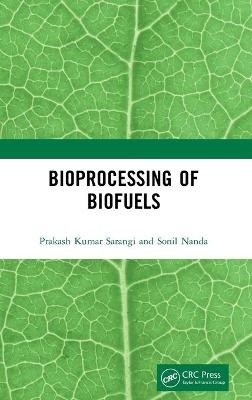
Bioprocessing of Biofuels
Seiten
2020
CRC Press (Verlag)
978-0-367-34084-1 (ISBN)
CRC Press (Verlag)
978-0-367-34084-1 (ISBN)
This book is a unification of topics relating to the cutting-edge applications of bioresources and green technologies to reinvigorate the biorefineries in positioning them within a competitive energy market. This volume serves as a reference book for undergraduate and graduate students, scientific investigators and research scholars.
The major issues relating to environmental sustainability such as a heavy dependency on fossil fuels, increased greenhouse gas emissions, pollution, global warming and climate change have prompted many efforts around the globe to seek alternative energy sources that have negligible environmental impacts and societal benefits. There is an immense interest in biofuels research throughout the world owing to its massive potential to address environmental concerns. Biofuels have the capacity to supplement current and future energy demands through being blended with fossil fuels or even replacing them completely as drop-in fuels in automobiles as well as for heating and the power industries. Waste biomass, primarily lignocellulosic biomass (e.g. agricultural crop residues, forestry biomass and energy crops) and microalgae can act as some inexpensive renewable bioresources for the production of biofuels and biochemicals. The prime focus of Bioprocessing of Biofuels is to shed light on this significant process, especially through microbial conversion technologies to recover and transform the inedible polysaccharides into hydrocarbon biofuels and bioenergy.
The book offers introductory coverage of the most crucial topics as follows:
A systematic overview of the state-of-the-art in the production and utilization of biofuels
Categorical bioprospecting of bioresources for biofuel production
Biomass pretreatment and enzymatic saccharification
Bioconversion of waste biomass and algae to liquid and gaseous biofuels
New developments in microbial fuel-cell technologies
Bioprocessing of Biofuels unites topics related to the cutting-edge applications of bioresources and green technologies to reinvigorate biorefineries, positioning them within a competitive energy market. Written to be instantly applicable, this volume offers a reference book for undergraduate and graduate students, scientific investigators and research scholars around the globe working in the areas relating to energy and fuels.
The major issues relating to environmental sustainability such as a heavy dependency on fossil fuels, increased greenhouse gas emissions, pollution, global warming and climate change have prompted many efforts around the globe to seek alternative energy sources that have negligible environmental impacts and societal benefits. There is an immense interest in biofuels research throughout the world owing to its massive potential to address environmental concerns. Biofuels have the capacity to supplement current and future energy demands through being blended with fossil fuels or even replacing them completely as drop-in fuels in automobiles as well as for heating and the power industries. Waste biomass, primarily lignocellulosic biomass (e.g. agricultural crop residues, forestry biomass and energy crops) and microalgae can act as some inexpensive renewable bioresources for the production of biofuels and biochemicals. The prime focus of Bioprocessing of Biofuels is to shed light on this significant process, especially through microbial conversion technologies to recover and transform the inedible polysaccharides into hydrocarbon biofuels and bioenergy.
The book offers introductory coverage of the most crucial topics as follows:
A systematic overview of the state-of-the-art in the production and utilization of biofuels
Categorical bioprospecting of bioresources for biofuel production
Biomass pretreatment and enzymatic saccharification
Bioconversion of waste biomass and algae to liquid and gaseous biofuels
New developments in microbial fuel-cell technologies
Bioprocessing of Biofuels unites topics related to the cutting-edge applications of bioresources and green technologies to reinvigorate biorefineries, positioning them within a competitive energy market. Written to be instantly applicable, this volume offers a reference book for undergraduate and graduate students, scientific investigators and research scholars around the globe working in the areas relating to energy and fuels.
Prakash Kumar Sarangi, Sonil Nanda
Chapter 1: Bioprospecting and Bioresources for Next-Generation Biofuel Production
Chapter 2: Advanced Biomass Pretreatment Processes for Bioconversion
Chapter 3: Bioconversion of Waste Biomass to Bioethanol
Chapter 4: Bioconversion of Waste Biomass to Biobutanol
Chapter 5: Bioconversion of Waste Biomass to Biomethanol
Chapter 6: Bioconversion of Waste Biomass to Biohydrogen
Chapter 7: Conversion of Algal Biomass to Biofuels
Chapter 8: Perspectives on Microbial Fuel Cells
| Erscheinungsdatum | 15.01.2021 |
|---|---|
| Zusatzinfo | 9 Illustrations, black and white |
| Verlagsort | London |
| Sprache | englisch |
| Maße | 152 x 229 mm |
| Gewicht | 272 g |
| Themenwelt | Medizin / Pharmazie ► Physiotherapie / Ergotherapie ► Orthopädie |
| Naturwissenschaften ► Biologie ► Botanik | |
| Naturwissenschaften ► Biologie ► Genetik / Molekularbiologie | |
| Naturwissenschaften ► Biologie ► Ökologie / Naturschutz | |
| Technik ► Medizintechnik | |
| Technik ► Umwelttechnik / Biotechnologie | |
| Weitere Fachgebiete ► Land- / Forstwirtschaft / Fischerei | |
| ISBN-10 | 0-367-34084-4 / 0367340844 |
| ISBN-13 | 978-0-367-34084-1 / 9780367340841 |
| Zustand | Neuware |
| Informationen gemäß Produktsicherheitsverordnung (GPSR) | |
| Haben Sie eine Frage zum Produkt? |
Mehr entdecken
aus dem Bereich
aus dem Bereich
Spiraldynamik - programmierte Therapie für konkrete Resultate
Buch | Hardcover (2021)
Thieme (Verlag)
CHF 146,95


